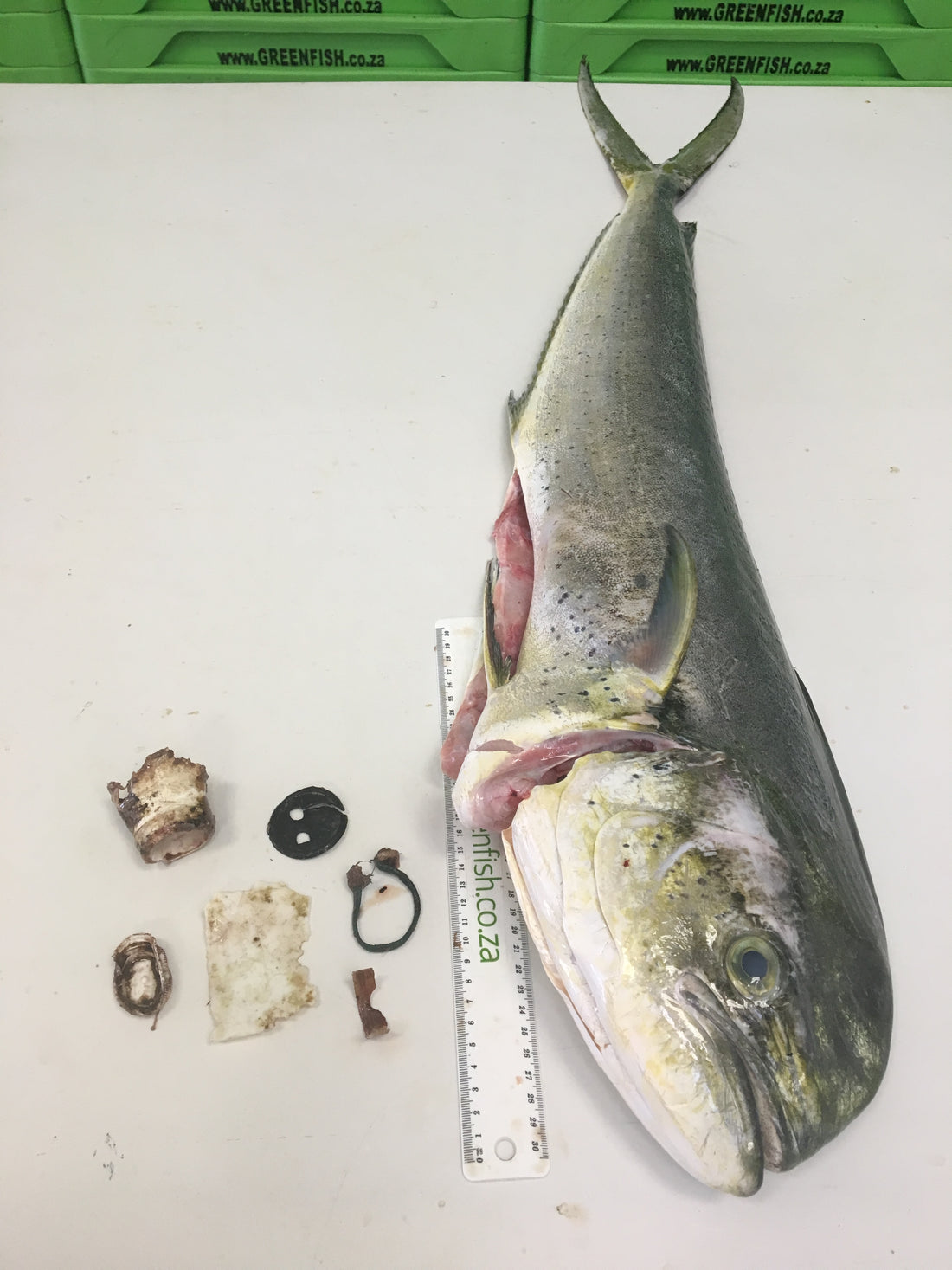
Plastic in our Oceans – and what each of us can do.
Share

Plastic in our Oceans – and what each of us can do.
Recently I caught a dorado off Cape Point. These fish are not common around Cape Town and only visit us when the waters are very hot or when a piece of debris drifts down, like in this case a tree, that carried many fish underneath it in its own little eco system. Dorado are famous for being the “chicken of the sea”, so I prepared this one to take home for dinner.
While filleting the dorado, I felt something unusual in the stomach. It is very common practice as a fisherman to check the stomach contents of a fish you have caught to see what they are feeding on, so you can best understand what baits to use or areas to target. What I found however was upsetting and something I have never experienced before. The stomach was rigid and on opening it, I found it to be mixed with plastic and bait fish. The plastic included the top half of a plastic bottle, and other large plastic pieces.
This dorado was still in good condition, as I think food was still passing through his system, but it got me thinking about how much plastic we each come into contact with in our daily lives. From all our groceries, drinks, cosmetic products, children’s toys, take away containers, packaging, cigarette butts, etc… one just needs to look around and see that we live in a culture where plastic exists almost everywhere.
Not all plastic is doom and gloom. Plastic has helped many people and made many things possible. It has also made some things cheaper and disposable. The convenience of disposable plastic items like food packaging (for example the wrapper on a chocolate) has made life easy and bred a culture of single use and throw away goods. Where the life span of the product purchased was often only a few minutes, the impact on our environment is many years.
Our beautiful oceans are the last stop for plastics as they blow off the land or flow down rivers. If the plastic is not responsibly recycled or put into a land fill, it ultimately lands up in the ocean at some stage, from where it is transported around the world in ocean currents.
In this journey ocean movement and waves break up the plastic into smaller pieces that can be consumed by fish, like in the case of this dorado. They further breakdown until they become micro plastics that are found almost everywhere now.
Once plastic has entered our oceans it becomes very difficult to recover and dispose of responsibly and at great cost. After big storms, like we have experience this week, lots of plastic is washed up on the shores which makes it a great time for beach clean ups. This obviously helps but what is the solution?
The easy solution is to simply stop plastic entering the ocean. Easier said than done, but with improved waste management systems and more pressure or incentive to recycle this could start the steps in the right direction.
Ultimately, we need scientist and plastic manufacturers to come up with new ways of packaging, and in the cases where plastic is essential, to work out how to make plastic break down easier so that it will not be around for the next century.
As individuals we can simply start small and be aware of our usage - each bit makes a difference. It can be as simple as using a refillable water bottle instead of buying a plastic disposable bottle of water daily. Small changes make a big difference. Changing our mind set to the principle of this example and building a culture of recycling will go a long way in the right direction.
We at Greenfish have also looked at our plastic usage and reduced wherever possible and changed habits. We use washable recyclable fish bins over single use containers, the incorporation of cardboard boxes over poly boxes where possible, and the limiting of vacuum packs by doubling fish portions up (2 portions in a vacuum bag instead of a single portion). We understand we still use some plastic, especially in cases where our food safety is of highest priority, however we are starting with what we can achieve immediately and hope to nurture this culture as we grow.
At the end of the day each little bit makes a massive difference.
